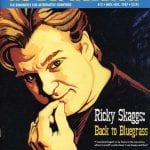Fred Eaglesmith – Prairie pearl
Somewhere between being a farm laborer, construction worker, antique restorer, chicken farmer and high-pressure water blaster, Fred Eaglesmith has released eight albums in the past 17 years. Those who are generally unfamiliar with the Canadian singer-songwriter might be surprised to learn that one of those releases, 1991’s There Ain’t No Easy Road, was a box set. Literally.
“I made a wooden box, stuck a label on it, stuck two tapes inside and photocopied a booklet. It was the only way I could afford to make a record,” Eaglesmith explains. “It made people sit up and look — like, ‘Holy cow, who’s this guy?’ Not many people knew at that point that it was my fourth album.”
If a gimmick is what it took for people to finally take notice, well, so be it. “I couldn’t get on the CBC, or commercial radio,” Eaglesmith recalls. “I couldn’t get booked into festivals hardly any at all in Canada…It was hard. I couldn’t understand it. Basically I was excluded from the community up here, and when I put out that box in 1991, I thought, ‘Jeez, this is the ultimate folk thing in the world.’
“Looking back, it’s great that all that happened because it made me struggle harder, made me write harder, made me tell the truth ’til I couldn’t help it. There was nobody to accept me, so I just had to believe in myself.”
Eaglesmith was brought up in Lincoln County, Ontario (between Lake Erie and Lake Ontario) with eight brothers and sisters in a strict Christian household. “I was raised real religious in a real poor rural environment, which is the formula for rock ‘n’ roll,” he observes. “It’s also the formula for being, y’know, um, totally fucked up.” By the time he was 15, he’d seen the bank foreclose on his family’s farm twice. About that same time, he saw David Frost interview John Prine on television. That was his clarion call; Eaglesmith set his mind on bringing his own sardonic wordsmithery to bear through music.
Lyrically, Eaglesmith evokes the same love for the land and its people as John Steinbeck, while touching on brutal truths and the inherent violence of the world in a way that rivals the novels of Harry Crews. In the song “Little Buffalo”, the characters Big Bear Henry and Two Turtle Jim drive into town on their rims, having sold their tires to buy beer (“It’s tar paper shacks, whiskey and smack/Two guns left on a five rifle rack/Somebody ’round here’s gonna get killed and that’s for sure”). When Eaglesmith and his band, the Flying Squirrels (Willie P. Bennett on mandolin/harmonica/vocals and Ralph Schipper on bass/vocals), sing in three-part harmony, Eaglesmith’s characters seem removed from the realm of fiction by the honesty in the words and music.
“There was a time in my life, when I was in my early 30s, I was just all messed up,” he says. “I was an outsider in the community I was raised in, I was an outsider in the community I was then living in, and in the musical community. I didn’t fit. And here I was, believing in what I did, basically with very little support, and it just screwed me up. I remember just thinking, ‘Am I wrong? I’ve written all these very personal songs, and they don’t mean anything to anyone but me…am I a crazy person?’ And then when I went to Nashville a decade later, I remember just running down the street screaming, ‘I was right all this time!’ It was very emotional, I had all these people going, ‘Son, where did you come from?’ It was such a weird thing after all those years.
“I never think about radio or industry stuff; the thing I can never do is think about what other people might think about me. I can’t do it. I was basically taught by my producer Scott Merritt to say, ‘Okay, does this sound honest, does this sound like the truth?’ I get letters from old fans of mine saying, ‘We don’t like the change,’ and I get letters saying, ‘We like your new stuff, we don’t like your old stuff.’ If I started listening to all that, I’d lose my mind. I have to do what I have to do.”
Merritt was in the producer’s chair for the third time on Lipstick Lies & Gasoline, Eaglesmith’s first album for Razor & Tie, which hit the stores October 21. This time out, Eaglesmith and his band cross musical borders at will, incorporating old-time country, Southern-fried rawk, lonesome bluegrass and tense, storied folk into a 44-minute listen. “It’s hard when you make a record…you don’t ever know if people are going to like it, especially a weird record like this,” Eaglesmith says. “You jump some genres and hold your breath. The whole time I was making this record, I was reading books about mountain climbing, and I just kept thinking, making this record is just like that. We’re going to be making this record, reach the peak and be on our way back down, and people are going to go, ‘Nah, we don’t like it.'”
The new CD kicks off with “Seven Shells”, a love song rife with the palpable tension Eaglesmith is renowned for. As he sings ‘I feel like I’m living in a Western movie that’s only just begun/And I’ve got seven shells in my six gun,’ you can imagine this character wearing his affections like chains, a tortured soul from the spirit realm. There’s also a hypersensory ode to a “Pontiac” here (“It’s a ’63 Stratochief/With three on the tree/And it belongs to me”), in which the vehicle becomes folklore through Eaglesmith’s descriptive prose.




